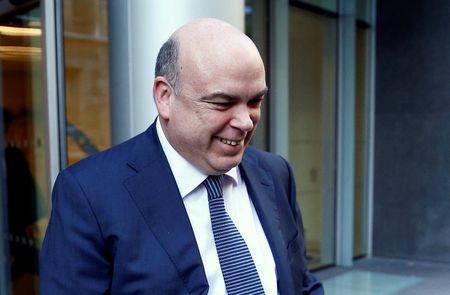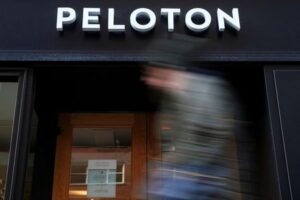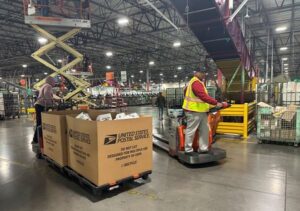By Paul Sandle
LONDON (Reuters) – Mike Lynch, the tech tycoon who died when his luxury yacht sank off Sicily, spent more than a decade building Britain’s biggest software company and almost as long again fighting charges he had inflated its value to secure a multi-billion-pound sale.
Lynch’s body was retrieved on Thursday from the wreck of Monday’s disaster, a senior Italian official said.
Lynch founded Autonomy in 1996 from his ground-breaking research at Cambridge University, and was lauded by shareholders, business leaders and politicians when he sold it to Hewlett-Packard for $11 billion 15 years later.
But in late 2012, HP stunned Wall Street and the City of London by saying it had discovered a massive accounting scandal. Lynch denied the charges.
HP wrote off $8.8 billion of value and triggered 12 years of legal battles in courtrooms from London to San Francisco.
Lynch was known for his formidable intelligence, turning his cutting-edge academic research into a multi-billion pound tech business and becoming known as Britain’s Bill Gates.
He did not shy away from clashing with critics of his company – including on one occasion Oracle’s Larry Ellison – and took a central role in building his defence.
He hired the biggest names in Britain’s legal and corporate communications professions, and invited some journalists into a room filled with neatly stacked piles of company documents to be briefed on its accounts.
HP had been drawn to Autonomy’s ability to search and organise unstructured information for clients, a killer application in a world of unlimited data, before the emergence of advanced artificial intelligence.
Lynch received about $800 million for his stake in Autonomy.
A NOD TO BAYES THEOREM
Autonomy’s software used patented algorithms based on a mathematical formula developed in the 18th Century by Reverend Thomas Bayes. In a nod to the formula, Lynch had named his yacht that sank off Italy the Bayesian.
HP pursued Lynch in a civil case in London’s High Court for $5 billion, with the entrepreneur spending 22 days in the witness box, one of the longest cross-examinations in the UK.
The U.S. firm won much of the case in 2022 after the judge found that Lynch and a colleague had fraudulently concealed a “fire sale” of hardware and engaged in convoluted reselling schemes to mask a shortfall in sales of Autonomy’s software, the business HP coveted. Damages are still to be decided in the civil case.
Lynch then faced extradition to the U.S. on criminal charges including wire fraud and conspiracy, where he could have faced decades in jail if found guilty.
He took the stand in San Francisco in his own defence, denying wrongdoing and telling jurors that HP had botched the integration of its acquisition.
“Autonomy was an extremely successful company,” he said.
Lynch was acquitted on all charges in June and freed after a year under house arrest. He said he was “elated” and looking forward to returning to his family and his estate in Suffolk, England, where he had a herd of rare-breed cattle and many dogs.
As part of the celebration, Lynch invited those who had supported him to join his family on his 56-metre (184-foot) yacht for a sailing holiday around southern Italy. Guests included his lawyer and a Morgan Stanley executive who had appeared as a character witness.
The boat was at anchor, its sails down, when it was hit by a violent storm before dawn on Monday and sank quickly.
His wife survived but on Thursday their younger daughter was still missing, the last person unaccounted for after four other bodies were recovered. The ship’s chef was also found dead hours after the disaster.
UK TECH CHAMPION
Lynch was born in 1965 and raised in Chelmsford near London. He said his parents, a nurse and a fireman, instilled in him an appreciation of the value of education.
At Cambridge University, he studied physics, mathematics and biochemistry, and went on to research signal processing for his doctorate. His thesis is still one of the most widely consulted in the university’s library, local media reports have said.
He founded Autonomy in 1996 and used some of the sale proceeds to become a champion of UK tech. His venture capital firm Invoke backed Darktrace, a British cybersecurity company in the process of being sold to U.S. firm Thoma Bravo for $5.32 billion, and other tech businesses.
“Mike’s ability to identify and solve complex problems was phenomenal, as was his ability to simplify and explain them,” said family friend Patrick Jacob, in a statement distributed by a Lynch family spokesperson.
“As a friend, Mike was never dull and always ready for a lively debate on almost any topic conducted with intelligence and convivial vigour. He could be challenging and direct but I never came away from seeing him without feeling my life was enriched by the experience.”
Lynch, a married father of two daughters, was keen to share his expertise.
He advised the government on science and innovation, was on the boards of the BBC and British Library, and was a fellow of both the Royal Academy of Engineering and the Royal Society.
After his acquittal, he vowed to campaign against the extradition treaty between Britain and the United States, which British critics have long called too one-sided, and he told the BBC in August that he could not have been acquitted without the money to fund his defence.
“You shouldn’t need to have funds to protect yourself as a British citizen”, he said.
(Editing by Kate Holton, Bernadette Baum, Sharon Singleton and Rosalba O’Brien)





